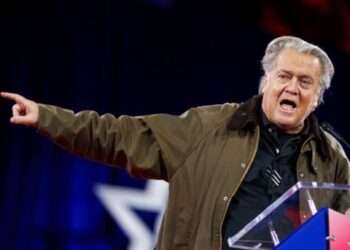Nigel Farage: “Boris Johnson Would Rather See Ukraine Annihilated Than Admit He Was Wrong”
In a conversation between Nigel Farage and Steve Bannon, the two discussed pressing political and geopolitical issues, including NATO, Ukraine, immigration, and the current state of leadership in the U.S. and U.K. Farage praised Matt Whitaker’s appointment as NATO Ambassador, citing Trump’s focus on fair burden-sharing among European nations. He criticized Europe’s reliance on the U.S. for defense and emphasized Trump’s commitment to enforcing accountability.
On Ukraine, both lamented the Western escalation of the conflict and Boris Johnson’s role in prolonging war, portraying it as misguided Churchillian posturing. Farage highlighted the growing Ukrainian desire for peace and the diminishing public support for the war, warning that NATO’s actions hinder Trump’s potential to broker peace.
Discussing immigration, Farage urged Trump to adopt Australia’s firm policies to deter illegal crossings, emphasizing that strict enforcement can stem the tide. Reflecting on his time in the U.K. Parliament, Farage criticized the lack of real-world experience among modern politicians and advocated for a second political revolution to ensure representation of the people’s views.
They concluded with concerns about the U.K.’s sovereignty, particularly the government’s decision to cede the Chagos Islands, potentially jeopardizing U.S. military interests. Farage dismissed claims that Trump would support such a deal.
Part One:
Nigel Farage Discusses Mass Migration In The West And The Importance Of Diego Garcia Island
Part Two:
Harnwell: Thanks to Trump, EU leaders got some ‘splainin’ to do to their own peoples over Ukraine
The conversation between Ben Harnwell and Steve Bannon explored global geopolitical dynamics, particularly surrounding the Ukraine war, Brexit’s impact, and Donald Trump’s potential return to power. Bannon opened by reflecting on the Brexit victory in 2016, attributing its success to figures like Nigel Farage and Raheem Kassam, and drawing parallels to Trump’s rise. The discussion transitioned to Ukraine, where Bannon criticized Western elites and NATO for escalating the conflict despite Ukraine’s heavy losses and the improbability of reclaiming territories like Crimea.
Harnwell highlighted the timing of U.S. actions, suggesting that Biden’s authorization of missile strikes was a political maneuver rather than a strategic one. He speculated that this escalation could be a calculated effort by the military-industrial complex to entangle Trump in prolonging the war, though Harnwell expressed confidence in Trump’s commitment to ending it swiftly if re-elected.
Both speakers underscored Europe’s precarious position, with nations like Germany facing economic struggles due to energy crises linked to the war. They questioned how European leaders could justify abandoning Ukraine after investing so heavily in its defense. Bannon pointed out the broader implications of Trump’s anticipated policies, including withdrawing U.S. support for Ukraine, which would leave European nations to address the fallout alone.
The discussion concluded with reflections on Trump’s sweeping electoral prospects, the potential collapse of globalist narratives, and the economic and political recalibrations required in Europe post-Trump’s resurgence.

![Bannon’s WarRoom, Show Clip Roundup 11/4/2024 [AM]](https://warroom.org/wp-content/uploads/2024/11/bannonsteve_022424gn06_w-350x250.webp)


